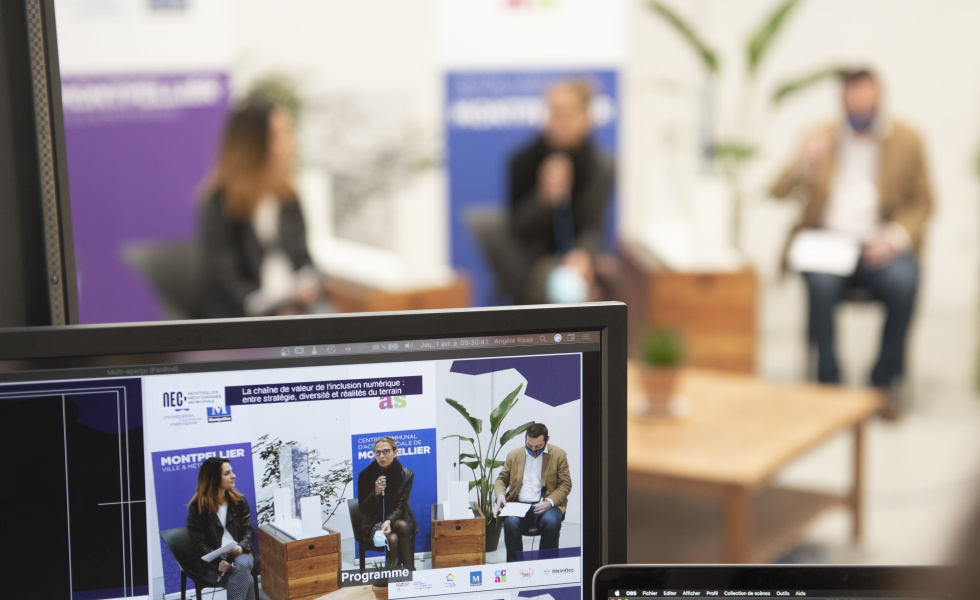While public authorities want
to digitalize 100% of all administrative processes by 2022,
over 20 million people in France are still far from the digital world: they either don’t use the Internet or use it very little, and they are generally not comfortable with its applications. The result is a system with people on one side who are at-ease with technology, and people on the other side who are excluded. This creates a risk of bringing about new inequalities.
“If we want to build tomorrow’s society under the right conditions, we must absolutely make access easier for all citizens,” insists Hind Emad, Montpellier Méditerranée Métropole Vice President in charge of Economic Development and Digital Technologies, speaking at the first edition of Numérique en Commun[S] Montpellier held at Tropisme Hall on April 1. The event was organized with the Montpellier CCAS social action community center – a certified “Digital Territory Manufacturer” (national territorial cohesion program in France) in partnership with the French National Agency for Territorial Cohesion (ANCT).
Broadcast as a videoconference, the event focuses on a vision of an inclusive, ethical, and citizen-oriented digital approach that is in the public’s general interest, providing everyone with the ability to take part, and respecting people’s rights and freedoms. There can be no smart city without its residents understanding the impact and advantages, and being able to benefit from it.
Many stakeholders around the Montpellier Métropole area have mobilized to drive this concept forward through innovative actions to serve users.
One example is the
Human at Home (HUT) project. Led by the CNRS, University of Montpellier, and Université Paul Valéry Montpellier 3, HUT unites a consortium that includes Montpellier Méditerranée Métropole and seven companies (Delided, EDF, Nexity, OCEASOFT, SensDigital, Synox, and Weda). HUT created a “connected apartment observatory”, with two student volunteers living there since 2018. It serves as an interdisciplinary experimental platform for studying the home-level and daily life in a hyperconnected world, also taking into consideration those things that we do not want.
In addition,
an international chair was created to focus on the uses and practices of smart cities, based on a collaboration between the University of Québec School of Science and
Management and University of Montpellier. Gilles N. Goala, co-holder of the chair, talked about the digital experience and social acceptability of innovation, including the contribution of companies in the digital ecosystem aware of their social role in the context of digital citizenship.
Emmanuel Mouton, CEO of Digital 113, a cluster for digital companies in the Occitanie region says: “We are working on the user experience. Human-machine interfaces need to be easier for people to learn. That is why companies now leverage sociologists, psychologists, and occupational specialists.” He adds: “We have a space here in the Montpellier Métropole area where we can demonstrate what digital technology can bring to citizens.”
And for good reason. Local authorities are getting involved, including the
Occitanie / Pyrénées-Méditerranée Region,
Hérault Departmental Council, and
Montpellier Métropole. They are all working together to fight the digital divide. “Between now and September, we will deploy a
network of 14 digital advisors around the Montpellier Métropole area,” announces Hind Emad. In addition,
Digital Passes will be offered to those residents who are most distant from digital technology and who would like to learn. Montpellier Métropole purchased 60,000 of the passes. The
Hérault Departmental Council will also experiment with that approach in the Béziers - Etang de Thau area.
The smart city of tomorrow really cannot be built without its citizens.
“For us, digital inclusion is a key step for implementing the Smart City,” confirms M’Hamed Belhandouz, Assistant General Director of Montpellier Méditerranée Métropole and Director of CCAS. “Digital technology needs to be tangible.”
It also needs to protect people and be equitable.

